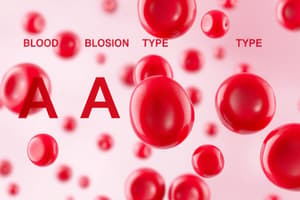Podcast
Questions and Answers
What is a complication of packed red cell transfusions that becomes more likely with increasing transfusion volume?
What is a complication of packed red cell transfusions that becomes more likely with increasing transfusion volume?
- Electrolyte Imbalance
- Clotting Abnormalities (correct)
- Hypothermia
- Coagulopathy
Why is it necessary to administer fresh frozen plasma and platelets concurrently with packed red cells?
Why is it necessary to administer fresh frozen plasma and platelets concurrently with packed red cells?
- To prevent hypothermia
- To prevent transfusion-related acute lung injury
- To prevent clotting abnormalities (correct)
- To prevent electrolyte imbalance
What is a cause of hypocalcaemia in blood transfusions?
What is a cause of hypocalcaemia in blood transfusions?
- Haemolysis of red blood cells
- Chelation of calcium by a calcium-binding agent (correct)
- Coagulopathy
- Dilution effect of packed red cells
What is a consequence of transfusing blood products that are not at body temperature?
What is a consequence of transfusing blood products that are not at body temperature?
What is a potential complication of trauma that can occur independently of blood transfusion?
What is a potential complication of trauma that can occur independently of blood transfusion?
What is the typical threshold for administering fresh frozen plasma and platelets concurrently with packed red cells?
What is the typical threshold for administering fresh frozen plasma and platelets concurrently with packed red cells?
What is a consequence of partial haemolysis of red blood cells during transfusion?
What is a consequence of partial haemolysis of red blood cells during transfusion?
Why is it necessary to monitor core body temperature during blood product transfusion?
Why is it necessary to monitor core body temperature during blood product transfusion?
What is the most common cause of acute haemolytic reaction?
What is the most common cause of acute haemolytic reaction?
What is the typical presentation of a patient with acute haemolytic reaction?
What is the typical presentation of a patient with acute haemolytic reaction?
What is the primary goal of initial management in a patient with suspected acute haemolytic reaction?
What is the primary goal of initial management in a patient with suspected acute haemolytic reaction?
What is the diagnosis of Transfusion Associated Circulatory Overload (TACO) typically confirmed by?
What is the diagnosis of Transfusion Associated Circulatory Overload (TACO) typically confirmed by?
What is the primary treatment for Transfusion Associated Circulatory Overload (TACO)?
What is the primary treatment for Transfusion Associated Circulatory Overload (TACO)?
What can be prescribed prophylactically to prevent Transfusion Associated Circulatory Overload (TACO)?
What can be prescribed prophylactically to prevent Transfusion Associated Circulatory Overload (TACO)?
What is the term for the destruction of donor red blood cells by the recipient's preformed antibodies?
What is the term for the destruction of donor red blood cells by the recipient's preformed antibodies?
What is the term for the transfusion-specific complications that occur soon after the transfusion has been started?
What is the term for the transfusion-specific complications that occur soon after the transfusion has been started?
What type of respiratory distress syndrome is Transfusion Related Acute Lung Injury (TRALI) a form of?
What type of respiratory distress syndrome is Transfusion Related Acute Lung Injury (TRALI) a form of?
What is the treatment for a mild allergic reaction caused by a blood transfusion?
What is the treatment for a mild allergic reaction caused by a blood transfusion?
What is the primary symptom of anaphylaxis in the context of a blood transfusion?
What is the primary symptom of anaphylaxis in the context of a blood transfusion?
What is the primary concern when a patient exhibits hypotension without anaphylactic symptoms during a blood transfusion?
What is the primary concern when a patient exhibits hypotension without anaphylactic symptoms during a blood transfusion?
What is a theoretical risk associated with blood transfusions?
What is a theoretical risk associated with blood transfusions?
What occurs due to an HLA mismatch between donor and recipient in the context of transfusion medicine?
What occurs due to an HLA mismatch between donor and recipient in the context of transfusion medicine?
What is the initial treatment for Transfusion Related Acute Lung Injury (TRALI)?
What is the initial treatment for Transfusion Related Acute Lung Injury (TRALI)?
What is characteristic of Non-Haemolytic Febrile Reactions?
What is characteristic of Non-Haemolytic Febrile Reactions?
Flashcards are hidden until you start studying
Study Notes
Transfusion-Specific Complications
- Can be divided into acute and delayed complications
- Acute complications occur soon after transfusion starts
Acute Transfusion Complications
- Acute Haemolytic Reaction
- Caused by transfusion of incorrect blood type (ABO incompatibility)
- Donor red blood cells are destroyed by recipient's preformed antibodies, resulting in haemolysis
- Presents with urticaria, hypotension, and fever, and may have evidence of haemoglobinuria
- Diagnosis confirmed by reduced Hb, low serum haptoglobin, high LDH and bilirubin, and positive Direct Antiglobulin Test (DAT)
- Treatment: Stop transfusion, begin supportive measures, and seek specialist advice
- Transfusion Associated Circulatory Overload (TACO)
- Presents with dyspnoea and features of fluid overload
- Often a problem in those who are already overloaded, such as those with cardiac failure
- Treatment: Oxygen and diuretic therapy
- Prevention: Prescribe 20mg furosemide prophylactically during transfusion in patients at risk
- Transfusion Related Acute Lung Injury (TRALI)
- Form of Acute Respiratory Distress Syndrome (ARDS)
- Presents with dyspnoea and features of pulmonary oedema
- High mortality rate
- Treatment: High flow oxygen, urgent chest radiograph, and specialist input
- Other Complications
- Mild Allergic Reaction: Pruritus, treated with anti-histamine and close observation
- Non-Haemolytic Febrile Reactions: Unpleasant but non-life threatening, treated with antipyretics and anti-histamines
- Anaphylaxis: Presents with hypotension and anaphylactic symptoms, treated as for anaphylaxis
- Infective/Bacterial Shock: Hypotension without anaphylaxis, treated with basic resuscitation, IV antibiotics, and senior help
Delayed Transfusion Complications
- Infection: Theoretical risk of developing Hepatitis B, Hepatitis C, HIV, syphilis, malaria, or vCJD
- Graft vs. Host Disease (GvHD): Occurs due to HLA-mismatch between donor and recipient
- General Complications
- Clotting Abnormalities: Due to dilution effect, can be reduced by administering fresh frozen plasma and platelets concurrently
- Electrolyte Abnormalities
- Hypocalcaemia: Due to chelation of calcium by preservative
- Hyperkalaemia: Due to partial haemolysis of red blood cells and release of intracellular potassium
- Hypothermia: Due to rapid transfusion of cool blood products, requires regular monitoring of core body temperature
Studying That Suits You
Use AI to generate personalized quizzes and flashcards to suit your learning preferences.




